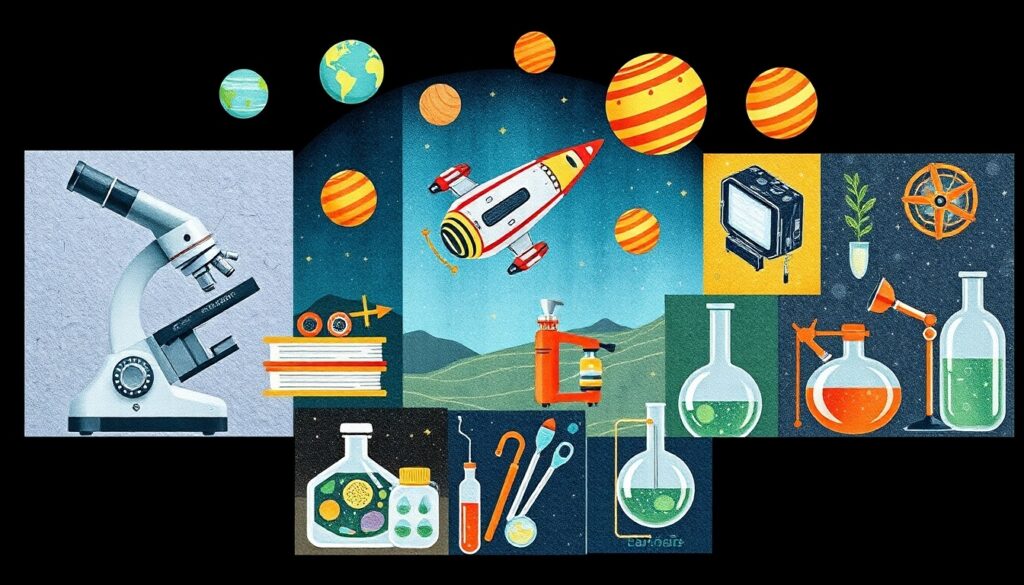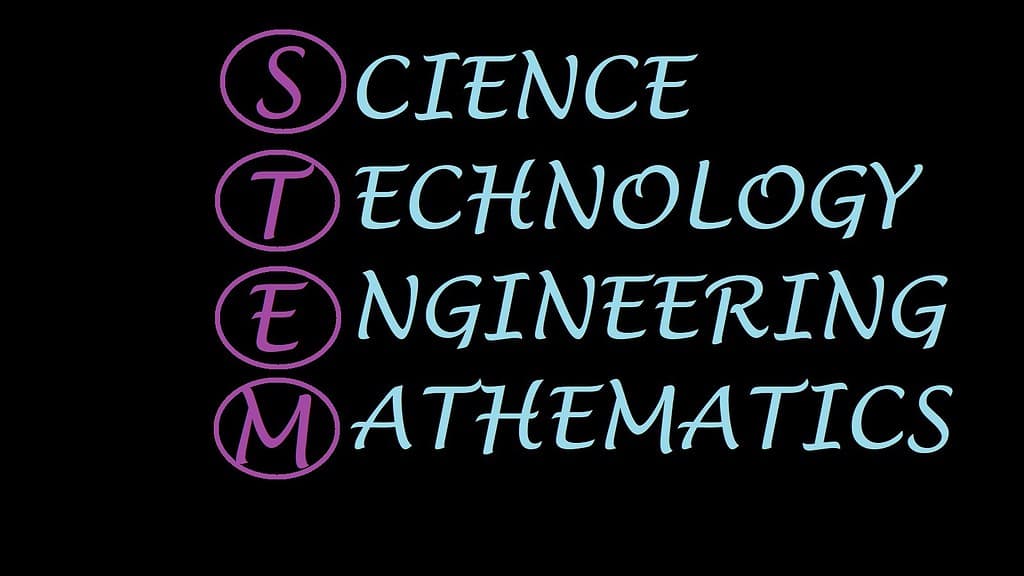Table of Contents
What are STEM Fields and Why They Are Important

STEM fields—science, technology, engineering, and mathematics—play a crucial role in the advancement of contemporary societies. They drive innovation, fuel economic growth, and address some of the world’s most pressing challenges. STEM fields offer the tools to understand the natural world, solve complex problems, and develop new technologies that improve lives. For instance, advancements in healthcare, communication, and infrastructure often originate from breakthroughs in these areas.
Engineers design more efficient systems, scientists explore and expand our knowledge of the universe, and mathematicians create models that help us predict and navigate future challenges. Technology, perhaps the most visible part of STEM fields, permeates nearly every aspect of daily life, from smartphones and transportation to data management and cybersecurity. Without expertise in these fields, progress in sustainable energy, artificial intelligence, and climate solutions would be significantly hampered.
In addition to their practical applications, STEM fields foster critical thinking, problem-solving, and adaptability. Individuals trained in these areas are not only equipped to handle specialized tasks but are also more likely to innovate and respond creatively to unforeseen challenges. These skills are increasingly important as the world becomes more interconnected and faces complex global issues such as climate change, pandemics, and cybersecurity threats. Moreover, the demand for professionals in STEM subjects continues to grow, with many industries requiring a workforce proficient in these disciplines to remain competitive.
Another crucial aspect of STEM fields is their role in education. Promoting STEM education from an early age helps to develop future generations who are not only knowledgeable but also capable of contributing meaningfully to technological and scientific advancements. By exposing young students to STEM subjects, we cultivate curiosity, resilience, and an understanding of how things work. These early experiences can spark interest in pursuing STEM careers, which are often well-paid and intellectually rewarding.
While STEM fields are vital to progress, they also require a level of societal investment and support. Governments and institutions must prioritize STEM education and research funding to maintain leadership in these critical areas. The future of STEM fields depends not just on individual talent but on a collective commitment to fostering innovation, inclusivity, and collaboration. Additionally, diversity within STEM fields is essential for broader perspectives, which often lead to more creative and comprehensive solutions. Increasing representation of women, minorities, and underrepresented groups ensures that the benefits of STEM advancements reach all communities.
Ultimately, STEM fields form the backbone of a future-oriented society. From environmental sustainability to medical advancements, these disciplines are key to tackling the most significant issues of the 21st century. While other fields of study contribute valuable insights and perspectives, the unique combination of technical expertise, scientific inquiry, and innovative potential found in STEM subjects makes them indispensable for shaping a better world. By continuing to promote and invest in these areas, societies can ensure that they remain at the forefront of progress and are well-prepared for the challenges and opportunities of tomorrow.
STEM Fields: Tough to Learn But Rewarding

Learning the STEM fields can be quite challenging. These subjects demand strong analytical skills, problem-solving abilities, and a deep understanding of complex concepts. Many students struggle with the abstract nature of mathematics, the technical aspects of engineering, or the precise requirements of scientific experiments. The path to mastering these areas is often marked by trial and error, moments of frustration, and a steep learning curve.
However, the hard work is undeniably rewarding. As students progress, they start to see how the theories and formulas they once found difficult can be applied to real-world situations, from designing innovative technologies to solving environmental challenges. Success in the STEM fields not only opens the door to exciting career opportunities but also offers a sense of accomplishment that comes with tackling difficult problems and finding creative solutions.
Moreover, the impact of the work in these fields can be far-reaching, contributing to advancements in medicine, infrastructure, and even space exploration. While the road to proficiency is tough, the intellectual and professional rewards make it a worthwhile endeavor for those who persist.
STEM Fields: 8 Important Reasons To Learn Them

1. Problem-Solving Skills
STEM fields are crucial in developing problem-solving skills, as they train individuals to approach complex situations with structured, analytical thinking. Whether in science, technology, engineering, or mathematics, students are constantly exposed to challenges that require logical reasoning and creative solutions. Unlike subjects that may focus more on rote memorization, STEM fields encourage students to understand the underlying principles and mechanisms that govern systems and phenomena.
This deeper comprehension enables them to break down problems into smaller, manageable parts, making it easier to address and solve them step by step. For example, in mathematics, complex equations can often seem overwhelming until they are broken down into simpler components, and the same approach is applicable in fields like engineering or computer science. By repeatedly practicing this method of dissection and analysis, individuals in STEM fields become adept at tackling problems that may initially seem insurmountable.
STEM fields also encourage the development of critical thinking by promoting experimentation and data-driven decision-making. In science, for example, the scientific method teaches students to form hypotheses, conduct experiments, gather data, and make conclusions based on evidence. This systematic approach to solving problems is not limited to the laboratory or classroom but is a transferable skill that can be applied to any real-world issue.
Engineering projects often involve designing solutions that must be tested, modified, and improved based on observed outcomes. Technology professionals face similar challenges when developing software or hardware, constantly iterating to improve functionality or fix bugs. Mastery of problem-solving in STEM fields thus goes beyond academics; it fosters resilience, adaptability, and innovation, qualities that are increasingly important in a rapidly changing world.
Additionally, STEM fields provide individuals with the tools to address some of society’s most pressing problems. Whether it’s finding ways to mitigate climate change, developing new medical treatments, or improving infrastructure, those skilled in STEM fields are at the forefront of creating solutions. Their problem-solving abilities are invaluable in tackling global challenges that require not only technical expertise but also creative thinking and persistence. In a world that increasingly demands effective solutions to complex issues, the problem-solving skills developed in STEM fields are more critical than ever.
2. Career Opportunities
STEM fields offer a wealth of career opportunities, with demand for skilled professionals steadily rising across the globe. As technology continues to advance, industries are increasingly reliant on individuals with expertise in science, technology, engineering, and mathematics. Whether it’s healthcare, manufacturing, information technology, or renewable energy, STEM fields are essential in driving innovation and maintaining competitiveness.
This growing demand translates into numerous job opportunities for those who excel in STEM subjects, often in positions that offer both job stability and high earning potential. For example, careers in data science, software engineering, and biotechnology are among the fastest-growing fields, and they offer competitive salaries that reflect the specialized knowledge and skills required.
The diversity of career paths within STEM fields is another reason why proficiency in these subjects is so important. Unlike some fields where career options may be limited, STEM fields offer a broad range of possibilities. A graduate with a degree in engineering could work in industries as varied as aerospace, civil engineering, or environmental sustainability. Similarly, a background in computer science could lead to careers in artificial intelligence, cybersecurity, or game development. The flexibility that comes with a STEM education allows individuals to explore different industries and find roles that align with their interests and strengths.
Moreover, careers in STEM fields often provide individuals with the opportunity to make a meaningful impact. Many professionals in these fields work on projects that directly contribute to societal well-being, such as developing sustainable energy solutions, advancing medical technologies, or improving infrastructure. Working in STEM fields often allows individuals to see the tangible results of their efforts, whether it’s a new technological innovation or a medical breakthrough that saves lives.
This sense of purpose can make STEM careers not only financially rewarding but also personally fulfilling. As the world continues to evolve and new challenges arise, the demand for skilled professionals in STEM fields will only grow, ensuring that those with a strong foundation in these subjects will have abundant career opportunities throughout their lives.
3. Innovation and Technological Advancement
STEM fields are the driving force behind innovation and technological advancement, pushing the boundaries of what is possible and continually reshaping the world. The fusion of science, technology, engineering, and mathematics creates a dynamic environment where breakthroughs in one area often spark advancements in another.
For instance, developments in computer science have revolutionized industries such as healthcare, finance, and education, while innovations in engineering have led to the creation of more sustainable infrastructure and transportation systems. STEM fields thrive on innovation, with professionals in these areas constantly experimenting, iterating, and seeking out new ways to improve existing technologies or create entirely new ones.
In many ways, the advancement of modern society depends on the progress made in STEM fields. From smartphones and renewable energy solutions to medical devices and space exploration, nearly every major technological leap has its roots in these disciplines. Scientists and engineers are at the forefront of tackling global challenges, using their expertise to develop solutions that not only address current needs but also anticipate future demands. The continuous advancement of artificial intelligence, for instance, holds the promise of transforming various sectors, including healthcare and agriculture, by enhancing both efficiency and precision.
STEM fields also play a crucial role in improving quality of life and solving practical problems. Engineers develop systems that provide clean water and sustainable energy, while advancements in medical technology help save lives and improve healthcare outcomes. Innovation in STEM fields doesn’t just stop at high-tech industries; it impacts everyday life, from the ways we communicate and travel to the food we eat and the clothes we wear. Technological advancements driven by STEM fields have made processes more efficient, reduced costs, and increased accessibility to resources and information.
Moreover, the culture of experimentation and forward-thinking within STEM fields encourages professionals to continuously push the boundaries of what is possible. They are not content with the status quo and are always seeking ways to improve and evolve technologies for future generations. This relentless drive for progress ensures that STEM fields will continue to be at the heart of technological innovation, shaping the future in ways that we cannot yet imagine.
4. Global Competitiveness
STEM fields are vital for maintaining and enhancing global competitiveness in an increasingly interconnected and technological world. As economies shift toward knowledge-driven industries, countries that excel in science, technology, engineering, and mathematics are better positioned to lead in innovation, economic growth, and technological leadership.
STEM fields form the foundation of industries such as advanced manufacturing, information technology, and biotechnology, all of which are critical to a nation’s economic success. Countries that prioritize education and investment in STEM fields can develop cutting-edge technologies, create high-paying jobs, and attract international talent. Nations that fall behind in these areas risk losing their competitive edge, as technological advancements are increasingly shaping the global economy.
Moreover, the most impactful innovations often come from collaboration between professionals in various STEM fields, driving advances that influence multiple industries. For instance, breakthroughs in materials science can fuel new engineering methods, while developments in data science can transform healthcare or finance.
A strong base in STEM fields equips a country’s workforce with the necessary skills to participate in these fast-evolving sectors. As a result, countries with a high proportion of STEM-trained individuals tend to be more resilient in the face of global challenges, adapting more quickly to shifts in the technological landscape. In a world where technological progress is accelerating, leadership in STEM fields is not just an advantage; it’s a necessity for remaining globally competitive.
5. Understanding of the Modern World
Proficiency in STEM fields is essential for understanding the technologies and systems that define the modern world. From smartphones and the internet to advanced medical treatments and renewable energy, many of the conveniences and innovations that shape daily life are the result of breakthroughs in science, technology, engineering, and mathematics.
Foundational knowledge of STEM fields allows individuals to better comprehend how these technologies work and the principles that govern them. For example, an understanding of engineering concepts helps explain how modern infrastructure is designed and maintained, while knowledge of mathematics and data science is essential for grasping the algorithms that drive everything from social media platforms to financial systems.
In addition, STEM fields provide the tools necessary to critically evaluate the impact of technology on society. As technology continues to evolve at a rapid pace, it is increasingly important for individuals to be informed consumers of new innovations. Understanding STEM fields empowers individuals to make decisions based on evidence, whether it’s evaluating the benefits of a new medical treatment or understanding the potential risks associated with artificial intelligence.
STEM literacy also promotes better decision-making on issues like climate change, public health, and energy consumption, as these complex issues require a grasp of scientific and technological principles. In an era where technology permeates nearly every aspect of life, a solid understanding of STEM fields is essential for navigating and thriving in the modern world.
6. Adaptability in a Changing Job Market
STEM fields provide the adaptability necessary to thrive in a job market that is constantly evolving due to technological advancements. As automation, artificial intelligence, and digital transformation reshape industries, professionals with STEM skills are uniquely positioned to adapt to new roles and emerging fields.
Unlike static professions, STEM fields are characterized by continual innovation and change, meaning that those who work in these areas are accustomed to learning new technologies and evolving their skill sets. This flexibility is a crucial asset in a job market where many traditional roles are being disrupted or replaced by technology. In particular, fields like data science, robotics, and biotechnology are rapidly growing, offering new opportunities for those with expertise in STEM fields.
Moreover, proficiency in STEM fields equips individuals with problem-solving abilities and technical expertise that are transferable across a wide range of industries. For example, skills gained in engineering or computer science can be applied to sectors as diverse as healthcare, finance, and transportation. This versatility enables individuals to pivot between different career paths as industries evolve.
As new technologies emerge, such as renewable energy systems or quantum computing, professionals trained in STEM fields are more likely to thrive in this changing environment, maintaining their relevance in a highly competitive job market. Adaptability, fostered by a strong foundation in STEM fields, is critical for long-term career success in a world where technological progress continues to accelerate.
7. Contributions to Societal Challenges
STEM fields are crucial in addressing many of the most pressing societal challenges, from environmental sustainability to global health crises. Professionals in science, technology, engineering, and mathematics are often at the forefront of efforts to solve problems that impact millions of people. For example, in the fight against climate change, engineers and scientists are developing renewable energy technologies, while mathematicians and data scientists model environmental impacts and create strategies for mitigation. These contributions are essential for making meaningful progress toward a more sustainable and equitable future. Without the expertise provided by STEM fields, efforts to combat these large-scale challenges would be significantly hindered.
In healthcare, STEM fields have led to advancements that improve the quality of life for people worldwide. Biomedical researchers and engineers work together to create innovative medical devices, develop new treatments, and find cures for diseases. The rapid development of vaccines and medical therapies, as seen during the COVID-19 pandemic, highlights how important STEM fields are in responding to public health emergencies. Moreover, technological advancements in fields like artificial intelligence and robotics are being applied to medical diagnostics and surgeries, further improving healthcare delivery. As global challenges become more complex, professionals in STEM fields will continue to play a pivotal role in developing solutions that benefit society.
8. Lifelong Learning and Curiosity
One of the most valuable aspects of STEM fields is their ability to foster lifelong learning and curiosity. The dynamic nature of these fields means that there are always new discoveries to be made and emerging technologies to explore. Those who engage in STEM fields are constantly challenged to expand their knowledge and keep pace with advancements in their respective areas. This continuous learning process stimulates curiosity and encourages individuals to remain intellectually engaged throughout their lives. Whether it’s exploring the latest breakthroughs in quantum computing or discovering new elements in chemistry, STEM fields offer endless opportunities for personal and professional growth.
Moreover, STEM fields promote a mindset of exploration and experimentation, encouraging individuals to ask questions, seek answers, and push the boundaries of what is known. This drive for discovery is not limited to formal education but extends into everyday life, where curiosity about how things work or how problems can be solved becomes a natural part of thinking. Lifelong learning in STEM fields also fosters adaptability, as individuals who are curious and eager to learn can more easily navigate shifts in technology and industry. In a world that is constantly changing, this ability to embrace new knowledge and remain curious is a significant asset for personal and professional development.
Beyond STEM Fields: Non-STEM Fields Are Also Equally Important

While STEM fields are undeniably important, it is equally crucial to recognize the value of non-STEM subjects such as the humanities, arts, social sciences, and business. These disciplines offer perspectives and insights that complement the technical knowledge provided by STEM fields. For instance, the humanities explore human culture, ethics, and history, offering a deeper understanding of the human experience. Arts and literature allow individuals to express emotions and ideas in ways that inspire empathy, creativity, and critical reflection. Social sciences, such as sociology and psychology, help us comprehend the complexities of society and human behavior, while business and economics play key roles in shaping how resources are managed and economies are built.
Non-STEM fields are also essential for fostering communication, ethical decision-making, and leadership. STEM professionals often rely on individuals trained in the humanities or social sciences to effectively communicate complex ideas to the public, shape policies, or consider the ethical implications of technological advancements. For example, advancements in artificial intelligence or biotechnology raise important moral questions about privacy, human rights, and environmental impact. Professionals from non-STEM backgrounds are critical in navigating these issues, as they bring valuable perspectives that focus on human welfare and social justice.
It is important for students to pursue their interests and passions without feeling pressured to choose a STEM path simply because it is considered more lucrative or practical. A world solely focused on technological and scientific progress would lack the emotional, cultural, and ethical richness that non-STEM subjects provide. Arts, for instance, shape societies in ways that go beyond utility, helping to build a sense of identity, meaning, and connection. Business and economics are essential for understanding how resources are distributed and how wealth is created, often influencing global policies that shape the world.
Ultimately, every discipline has its place in building a well-rounded and functioning society. Those who have a passion for non-STEM subjects should embrace their interests without hesitation, as their contributions are just as important as those in STEM fields. The world needs diversity in knowledge and expertise to address the full range of challenges and opportunities that arise. Each discipline, whether STEM or non-STEM, offers unique tools and insights that, when combined, can lead to a more thoughtful, innovative, and balanced society.
*This article is only for informational purposes.
**Do not make your important decisions based solely on the information provided in this article. Do your own research.
***Consult an expert in case of any confusion or emergency. Consult a doctor in case of a medical emergency.
Read More Science and Space Articles
- Making Your Kid Efficient At STEM Subjects: 8 Important Steps
- Making Your Kid Science Enthusiast: 8 Important Steps
- Becoming A NASA Aspirant: 8 Important Steps You Must Follow
- Top 4 Colored Rice That Are Superior to White Rice
- Top 8 Important Wellness Habits That You Must Follow
- Top 5 Amazing Whole Grains That Are Healthier Than Rice
- Indian Space Program: 8 Incredible Achievements
- China’s Space Program: 5 Amazing Accomplishments
- Oranges: 11 Incredible Facts About This Tangy Citrus Fruit
- NASA’s MOXIE Creates O2: Big Step Towards Mars Colonization
- Top 5 Amazing Properties of Time That Defy Common Sense
- 10 Factors for Emergence of Intelligent Life in The Universe
- Space Science: 6 Vital Reasons Why We Should Invest in It
- Solar System: 10 Astonishing Uniqueness of our star system
- Our Universe: An Incredible Journey of 13.7 Billion Years
- Top 6 Solar System Objects That Might Destroy Life On Earth
- Certain End of The Universe: 4 Forces of Nature to Watch Out For
- Big Bang: An Incredible Start of Universe 14 Billion Years Ago




